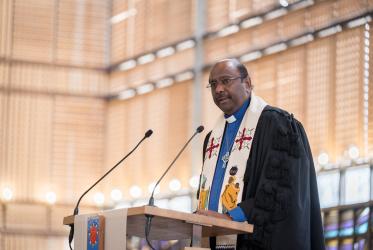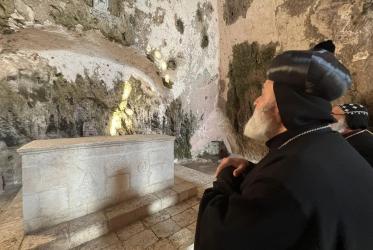Homily by Victor W. C. Hsu at the Ecumenical Centre morning prayer during the ecumenical officers' network meeting 2017
Dr Nagi Shafik is a Christian, a Copt from Egypt, a man of deep faith. He used to be a representative of the WHO in Pyongyang. I have known him for 15 years. Once in Pyongyang, while he and I were having lunch in the Diplomatic Compound, a North Korean government MOH official came over to express his deep appreciation to Dr Shafik because Dr Shafik was being transferred elsewhere by WHO. He said that do he wanted to know why he stayed for ten years in Pyongyang under a very difficult humanitarian environment.
Dr Shafik had to work with hospitals that were very poorly equipped and faced a health service which suffered a chronic 50% shortage in medicine and medical supplies.
Moreover, North Korea was designated by the UN as a hardship post so all the UN and EU employees receive, every two months, an all expense paid four-days of Rest and Relaxation in Beijing to recharge their spirits. So this Korean government official was very curious and wanted to know what his motivation was. What kept you here in the DPRK for ten years?
Without pausing to consider his reply, Dr Shafik said: “I have two inspirations, I’m a medical doctor and wherever there is sickness I must use all my training and skill to provide succor to my patient. Second, I am a Christian and I believe that God loves the world. You are part of the world and your children are also God’s children whom he loves.”
I don’t know how Dr Shafik’s response impacted the DPRK official. But his testimony moved me to the core. The DPRK has been very much in the news as Olav pointed out yesterday afternoon. Dr Shafik’s words continue to reverberate in my head. “God loves the world. You are part of the world and your children are also God’s children whom he loves.”
We are all quite familiar with Isaiah’s passage that Gail read this morning. God entrusts us to proclaim the good news of deliverance:
to open the eyes that are blind,
to bring out the prisoners from the dungeon,
from the prison those who sit in darkness.
Putting it differently, God expects us to be a light to the nations.
In this passage, the prophet certainly calls on us to take seriously our responsibilities in our society. He demands much of us. We are not just expected to bring good news or to proclaim release to the captives,. We are required to build up the ancient ruins, to raise the former devastations and to repair the ruined cities, Isaiah points out in Chapter 61.
This was what Dr Shafik personified and he did it with much pride and joy for 10 years in the most demanding environment for humanitarian aid. Today, Dr Shafik is working in Indonesia’s WHO office, most probably bearing witness to the Indonesian Muslims in his humble way..
In many of our churches we try to do what we can in the face of natural disasters and calamities. Some of us might not have experienced directly traumatic experiences of nature’s immense fury and loss of life. But we have all been witnesses in one way or another.
Prince, you felt the earth move and destroy in Christchurch. Rev. Lyim and my PCT colleagues saw the destructive aftermath of typhoon Morakot which caused a mudslide that buried entire villages. Prawate, you saw the aftermath of the Indian Ocean tsunami in Thailand. In 2011, I was invited by the NCC Japan and the ACT Alliance to establish a disaster response in Japan. I saw firsthand the unspeakable devastation of the triple disaster in Fukushima, powerful earthquake, frightening tsunami and the subsequent and ongoing nuclear fallout.
In the scripture, Prophet Isaiah expects us to build up the ancient ruins, raise the former devastation and repair the ruined cities. Providing permanent shelter, reconstructing and rebuilding the ruined cities are essential for destroyed lives. Today, such rebuilding projects are beyond the financial means of any church institution, whether a local church or the LWF or the WCC.
For the body of Christ, is it possible to turn a blind eye to despair and desperate need? What should be our role?
Indeed, Isaiah doesn’t allow us to rest easy. He wants to stir up our dis-ease and discomfort. He urges us to be more than just rebuilders of physical destruction.
Listen again to the scripture:
I have called you in righteousness,
I have taken you by the hand and kept you;
I have given you as a covenant to the people,
a light to the nations
You and I rightly ask: how do we serve as God’s fulfilment to God’s people? How do we become a light to the nations?
In Chapter 61, Isaiah sheds light on how we should perform that role.
*comfort and provide all who mourn,
* give them garland instead of ashes,
*the oil of gladness instead of mourning
*the mantle of praise instead of a faint spirit.
He expects us to comfort AND provide for all who mourn. For those in mourning, our ministry is not simply to comfort but also to provide, in order that they are embraced with love. Is it fair for me to say that the churches are much better in comforting than in providing for all who grieve.
What about the injunction: to give them garland instead of ashes…..
In the Pacific and in some Asian countries today, giving a garland is to welcome a visitor to your home or your country.
The prophet says that we must not only help to bury the dead. Instead of ashes, we must give the families hope by welcoming them to our home so that they are cared for with shelter, food and security.
What about giving those who mourn the oil of gladness? Wow, what a challenge to us today. Olav was in Tonga recently. I remember my visits there years ago where during the wedding ceremony, amidst dancing, the brides are adorned generously with the oil of gladness to symbolize their purity.
So the churches cannot escape its anointing ministry….much as we may neglect this charge. Let’s hear from the Hebrews 1:9
Thou hast loved righteousness, and hated iniquity; therefore God, even thy God, hath anointed thee with the oil of gladness above thy companions.
Both the Old Testament and the New Testament speak about this priestly role. This is the natural consequence of having been anointed by God. It is incumbent upon us that we give—or anoint-- those who mourn including our neighbours and companions, the oil of gladness.
In anointing them, the church demonstrates the ultimate manifestation that God so loved the world.
Moreover, our priestly duty must be performed as a ministry with joy because the oil of gladness has anointed us.
God’s joy penetrates deep within our hearts, shapes and strengthens them as the body of Christ.
So the joy that is God’s gift to the church, turns into an irresistible desire within us to pass on and share with others all that we have richly received.
Grace fills us to the brim and overflows, fully and abundantly.
We are anointed down to our very bones and our joy, which wells up from deep within, is the echo of this anointing.
This joy is at the same time a missionary joy because it must spread and attract people from all walks of life, starting with those who are sick, who are lame and who are blind.
Our faith must also be proclaimed to all corners of the earth, wherever there is spiritual hunger and alienation. Two years ago, Olav, Chris Ferguson and Mathews George Chunakara participated and preached in my church’s 150 years of founding by Scottish and Canadian missionaries.
I have little doubt that the two first missionaries: James Maxwell and George Mackay were imbued with a joy that they felt within their hearts. Graced filled them to the brim and overflowed that they wanted to go to Taiwan is 1865 to share God’s “evangil.”
“Go therefore and make disciples of all nations, baptizing them in the name of the Father, of the son and of the Holy Spirit, and teaching them to obey everything that I have commanded you.” “For you are a chosen race, a royal priesthood and a holy nation, God’s own people, in order that you may proclaim the mighty acts of him who called you out of darkness into his marvelous light.” (1 Peter 2:9).
You and I are called to perform a ministry that is simultaneously compassionate, priestly and missionary, because this is the good news for today’s world.
Our having been anointed has transformed us into God’s chosen people and this transformation comes with an immense obligation.
It means that in turn we must anoint God’s people wherever they are and regardless of their circumstance: healing and sanctifying them, blessing, comforting and evangelizing them.
Indeed, we must be rebuilders not just of ruins but also of spirits.
We must do more than provide for those who mourn. We are simultaneously evangelists who carry the garland of welcome proclaiming the good news that Jesus is our Lord and that God so loved the world.
AMEN



